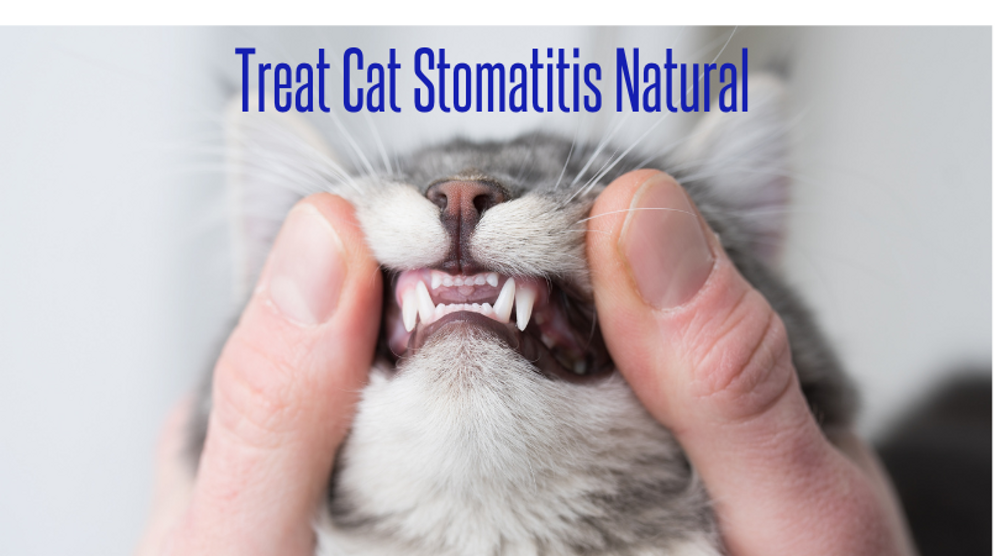Understanding and Treating Stomatitis in Cats Naturally
Posted by Jewel on May 22, 2024
Stomatitis is a painful and often debilitating condition in cats characterized by severe inflammation of the mouth and gums. This condition can lead to difficulty eating, excessive drooling, and a decrease in overall quality of life. Traditional treatments often involve antibiotics, steroids, or even tooth extractions, but there are natural ways to help manage and alleviate the symptoms of stomatitis in cats.
What is Stomatitis in Cats?
Stomatitis is an inflammation of the mucous membranes in a cat's mouth, often leading to redness, swelling, and ulceration. It can be caused by various factors, including:
- Viral infections (like Feline Herpesvirus or Calicivirus)
- Bacterial infections
- Autoimmune responses
- Dental issues
Symptoms of Stomatitis
- Red, swollen gums
- Ulcers or sores in the mouth
- Bad breath
- Excessive drooling
- Difficulty eating or reluctance to eat
- Weight loss
Natural Treatments for Stomatitis
1. Colloidal Silver
Colloidal silver is known for its antimicrobial properties and can be used to help control infections and promote healing. Here's how you can use it:
- Topical Application: Apply a few drops of colloidal silver directly to the affected areas in your cat's mouth using a dropper or a cotton swab. Do this 2-3 times a day.
- Oral Administration: Add colloidal silver to your cat's water bowl. A few drops daily can help fight off infection from within.
2. Coconut Oil
Coconut oil has natural antibacterial and anti-inflammatory properties. It can soothe the inflamed tissues and promote healing.
- Topical Application: Gently apply a small amount of coconut oil to the gums and affected areas.
- Oral Administration: Mix a small amount (1/4 teaspoon) into your cat's food daily.
3. Probiotics
A healthy gut can improve your cat's immune system and help combat infections.
- Supplementation: Choose a high-quality, cat-specific probiotic supplement and add it to your cat's diet as per the product instructions.
4. Herbal Remedies
Certain herbs have anti-inflammatory and antimicrobial properties that can help manage stomatitis symptoms.
- Aloe Vera Gel: Apply a small amount of pure aloe vera gel to the affected areas in the mouth.
- Calendula: A calendula rinse can help soothe the mouth. Brew calendula tea, let it cool, and gently swab the affected areas with it.
5. Diet Adjustments
Feeding your cat a high-quality, species-appropriate diet can support overall health and boost the immune system.
- Raw or Cooked Diets: Consider switching to a raw or gently cooked diet that is free from additives and fillers.
- Soft Foods: Ensure the food is soft and easy to eat to avoid further irritation.
Supporting Your Cat’s Health
In addition to these treatments, it’s important to provide overall support to your cat's health:
- Regular Dental Care: Maintain regular dental hygiene by brushing your cat’s teeth and using natural dental care products.
- Stress Reduction: Minimize stress in your cat’s environment as it can exacerbate symptoms.
When to Consult a Veterinarian
While natural treatments can be effective, it’s crucial to monitor your cat's condition closely. If your cat’s symptoms worsen or do not improve, consult a veterinarian. They can provide guidance and ensure that your cat receives the necessary care.
Conclusion
Stomatitis in cats can be a challenging condition, but with natural treatments like colloidal silver, coconut oil, probiotics, and herbal remedies, you can help manage and alleviate the symptoms. Always remember to consult with your veterinarian before starting any new treatment regimen.
By integrating these natural approaches and maintaining regular health care practices, you can support your cat's journey to recovery and ensure they lead a happy, healthy life.
Stay high-vibe and holistic!
Jewel
Holistic High Vibe Tribe

